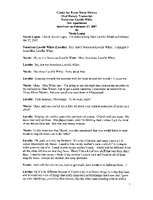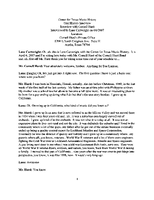Interview with Lavelle White, February 27, 2007 - audio
Description
Nicole Lopez interviews Lavelle White.
Lavelle talks about her childhood and singing in the church. She talks about the movie, Magnificent Dead, and that she'll be acting in. She talks about songs she has written and how she's had some of those songs stolen from her without recieving credit. She talks about the Blues and jazz artists she listens to. She explains the jealousy from other people she's had to face throughout her career. She gives her opinion on rap music. She explains how her privacy is important to her. Throughout the interview, she mentions her relationship with God.
Lavelle talks about her childhood and singing in the church. She talks about the movie, Magnificent Dead, and that she'll be acting in. She talks about songs she has written and how she's had some of those songs stolen from her without recieving credit. She talks about the Blues and jazz artists she listens to. She explains the jealousy from other people she's had to face throughout her career. She gives her opinion on rap music. She explains how her privacy is important to her. Throughout the interview, she mentions her relationship with God.


